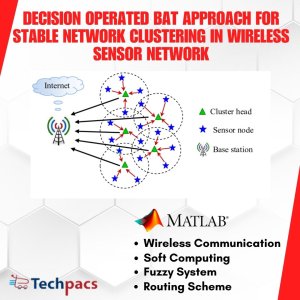Enhancing Wireless Vehicle Communication Through Decision Feedback Channel Estimation with PSO Optimization
Problem Definition
In the domain of channel estimation for V2X communication in MIMO-OFDM schemes, there exists a pressing need to address the limitations of current approaches. The existing methods, both blind and non-blind, rely on mathematical models and the transmission of pilot signals for estimating the channel matrix components. However, the filter coefficients used in these estimation techniques have not been clearly defined, leading to suboptimal output results. Moreover, traditional techniques lack the use of algorithms to enhance accuracy in the estimation process. As a result, the accuracy and efficiency of channel estimation in V2X communication systems are compromised, hindering the overall performance of the network.
To overcome these limitations and improve the effectiveness of channel estimation, a new technique must be proposed that addresses the shortcomings of current methods. By defining filter coefficients with precision and incorporating algorithms for enhanced accuracy, the proposed technique aims to provide a more reliable and efficient solution for channel estimation in MIMO-OFDM schemes.
Objective
The objective of this research project is to address the limitations of current channel estimation methods in V2X communication systems by proposing a novel technique called Decision Feedback Channel Estimation (DFCE). By combining QPSK modulation with the Particle Swarm Optimization algorithm, the aim is to improve the accuracy and efficiency of channel estimation in fast fading channels for urban and highway environments. The project seeks to define filter coefficients with precision, incorporate algorithms for enhanced accuracy, and provide a more reliable solution for channel estimation in MIMO-OFDM schemes. Ultimately, the goal is to achieve an improved output compared to traditional methods and contribute to enhancing V2X communication systems.
Proposed Work
In this research project, the problem of channel estimation in QPSK modulated systems is addressed. Various existing channel estimation methods have limitations in terms of defining filter coefficients and providing accuracy to the system. To overcome these limitations, a novel technique called Decision Feedback Channel Estimation (DFCE) is proposed. The objective of the project is to optimize the performance of DFCE by combining QPSK modulation with the Particle Swarm Optimization algorithm for achieving more accurate and efficient channel estimation. The proposed work involves developing a new method to improve V2X communication in urban and highway environments.
The Decision Feedback Estimation Channel method is utilized to offer better performance in fast fading channels compared to traditional techniques. In addition to defining filter coefficients for the estimation channel technique, a Particle Swarm Optimization technique is employed to provide accuracy and better results. The project involves a sequential process starting from signal modulation, transmission, reception, and demodulation, and utilizing the Decision Feedback Channel Estimator with Particle Swarm Optimization for accurate and efficient channel estimation. The ultimate goal is to achieve an improved output compared to traditional methods and contribute to enhancing V2X communication systems.
Application Area for Industry
This project can be used in a variety of industrial sectors including telecommunications, automotive, and transportation. In the telecommunications industry, this project's proposed solutions for channel estimation can help improve the accuracy and efficiency of V2X communication, leading to better connectivity and reduced congestion on networks. In the automotive sector, the use of Decision Feedback Estimation Channel method with Particle Swarm Optimization can enhance communication between vehicles, leading to improved safety through features like collision avoidance and traffic management. Additionally, in the transportation industry, the project can aid in reducing CO2 emissions by optimizing communication between vehicles and infrastructure, resulting in better traffic flow and reduced environmental impact. Overall, the benefits of implementing these solutions include enhanced system accuracy, improved performance in fast fading channels, and overall optimization of communication processes across different industrial domains.
Application Area for Academics
The proposed project can enrich academic research, education, and training by providing a novel approach to channel estimation in V2X communication systems. This project offers a unique method of defining filter coefficients for Decision Feedback Estimation Channel (DFCE) and optimizing its performance using Particle Swarm Optimization (PSO) technique. By addressing the limitations of traditional channel estimation techniques, this project opens up new avenues for research and innovation in the field.
Researchers in the domain of wireless communication, particularly those working on V2X connectivity and channel estimation, can benefit from the code and literature generated by this project. MTech students and PhD scholars can use the proposed method as a reference for their own research work, gaining insights into advanced algorithms and optimization techniques in wireless communication systems.
The relevance of this project lies in its potential applications for improving the accuracy and efficiency of channel estimation in fast fading channels, which are common in V2X communication scenarios. By incorporating PSO optimization into the DFCE method, the project aims to provide better results compared to traditional techniques, thereby enhancing the reliability and performance of V2X communication systems.
In the future, this project could be extended to explore the application of other optimization techniques or to investigate the impact of various channel conditions on the performance of the DFCE method. By continuing to refine and expand upon the proposed approach, researchers can further advance the field of wireless communication and contribute to the development of more robust and reliable V2X systems.
Algorithms Used
DFCE, or Decision Feedback Channel Estimation, is employed in the project to define the filter coefficients and improve the accuracy of the estimation channel technique. It offers excellent performance in fast-fading channels, making it a suitable choice for the project's objectives of reducing congestion, traffic accidents, and CO2 emissions through wireless vehicle association. PSO, or Particle Swarm Optimization, is used as an optimization technique to enhance the accuracy and efficiency of the system compared to traditional methods. By leveraging PSO, the project aims to achieve better results and accuracy in the transmitter-receiver signal processing chain. These algorithms play a crucial role in achieving the project's goals by improving the estimation performance and overall system accuracy, leading to enhanced efficiency in mitigating traffic-related issues.
Keywords
SEO-optimized keywords: channel estimation, wireless association, V2X communication, decision feedback estimation channel method, filter coefficients, accuracy optimization, particle swarm optimization technique, OFDM modulation, OFDM demodulation, additive white gaussian noise, wireless communication systems, wireless channels, fast fading channel, signal evaluation, MIMO-OFDM schemes, blind channel estimation, non-blind channel estimation, pilot signals, training sequences, channel impulse response, adaptive channel estimation, signal-to-noise ratio, fading channels, performance improvement.
SEO Tags
channel estimation, modulated systems, wireless communication, performance improvement, estimation techniques, channel estimation algorithms, pilot signals, training sequences, channel impulse response, equalization, adaptive channel estimation, blind channel estimation, wireless channels, signal-to-noise ratio, fading channels, OFDM, MIMO-OFDM, V2X communication, Decision Feedback Estimation Channel method, particle swarm optimization, fast fading channel, CO2 emission reduction, urban environments, highway environments, research methodology, wireless vehicle communication, resource allocation, optimization techniques, wireless sensor networks.
| Shipping Cost |
|
No reviews found!

















































No comments found for this product. Be the first to comment!